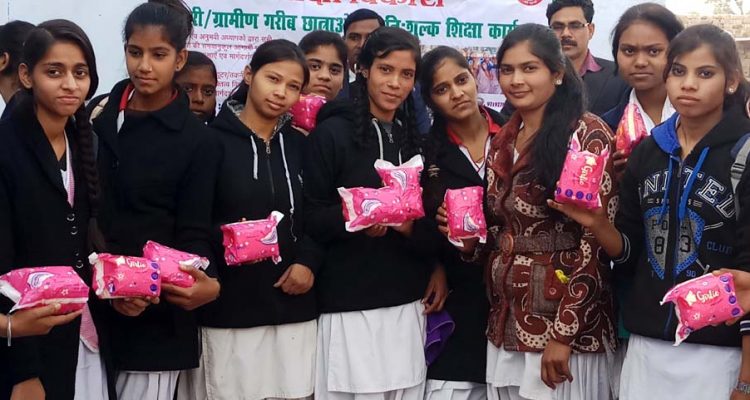Imagine you are a 12-year old girl living in a remote village in India, and someone gives you a bright colorful box. You open it and take out one of the white objects. You notice it’s oblong shape and lift up the strip of paper on the back to reveal a sticky side. What is it? The person tells you it’s a pad, yet you have never heard that word before. According to an article by NDTV, this is the reality for 23 million girls in India every year who are forced to drop out of school because they do not have access to this simple sanitary pad. It is a human right for those who menstruate to manage their periods in a healthy and dignified way. Implementing education on menstrual hygiene management (MHM) and addressing taboos surrounding menstruation would help girls in India continue their education. In addition, investing in solutions from local communities would provide people who menstruate with affordable materials to empower them to live a healthy and productive life.
Comprehensive education on menstruation and MHM needs to be implemented in schools and communities for both girls and boys of puberty age to build awareness and make progress towards gender equality. Menstruation, or having a period, is a natural bodily process of vaginal bleeding that happens as part of the menstrual cycle that girls, women, transgender and non-binary people (menstruators) experience. According to the 2014 “Spot On!” report by the non-governmental organization (NGO), found in the same NDTV article, since 71% of adolescent girls in India remained unaware of menstruation until their first period, education would help to reduce their fears and confusion.
While menstruation is a natural function of the body, the lack of awareness means menstruators are ostracized. For example, in the documentary, “Period. End of Sentence.”, which explores the stigma around menstruation in a rural village of the Hapur district, India, one of the young men explains he heard menstruation is “ a type of illness that mainly affects women.” This conveys the ignorance and lack of education on these topics. Some of this is due to the cultural taboos surrounding menstruation. When a person in the family is menstruating, they are not allowed to be in the temple because they are considered to be ‘dirty.’ In the documentary, some girls shared that elders tell them “your prayer isn’t heard no matter how much you pray.” That is heartbreaking and shatters the fragile confidence of a girl that is becoming a young woman.
Moreover, change starts at home with open dialogues about menstruation in families to foster the support needed for menstruators. By educating mothers, they can help educate their daughters and reduce the shame and stigma around menstruation. Educating females on their menstrual cycles can aid them in making informed decisions about sexual and reproductive health in the future. This relates to the UN Sustainable Development Goal (SDG) 5: gender equality which aims to empower women and girls.
Investments for menstrual products and proper facilities have to be increased to improve menstruators’ health and futures. One local solution highlighted in the documentary is Arunachalam Muruganantham’s machine that makes low-cost sanitary pads. He was inspired after learning his wife used old rags because she couldn’t afford sanitary napkins. According to a NDTV article by Aishwarya Upadhyay, this is a common dilemma as only 36% of India’s menstruating females use sanitary napkins. Others resort to using old cloths, leaves, mud and other unsuitable materials to manage their flow. According to the same NDTV article, these materials can contain bacteria that can lead to contracting cervical cancer, and infections of the reproductive and urinary tract. These infections can be prevented by using sanitary pads.
Rural women are taught how to make the pads using the machines. They also host demonstrations and sell pads. This solution enables women to make money while also managing their menstrual cycles in a safe and hygienic way. Similar practices of employing women to make affordable yet high quality sanitary pads occur in the slums of Mumbai, India through the Myna Mahila Foundation. Furthermore, improving access facilities that prioritize water access, sanitation and hygiene (WASH) practices would empower menstruators to have dignity when they menstruate. Specifically, having toilets that ensure privacy, water and soap for hand washing, and containers for proper disposal of used materials are needed. These would make progress towards SDG 6.2 which aims to improve sanitation while focusing on the needs of females and those in vulnerable situations. With the proper resources, those who menstruate can continue their education and work.
While some say that sanitary pads are not the solution to helping menstruators manage their periods, the other alternatives are not as effective to those living in rural areas. While commercial disposable pads contain significant amounts of plastic, the pads that those in rural areas make are biodegradable and don’t use plastic. Additionally, menstrual cups and reusable cloth pads are not feasible for menstruators of rural areas because they do not have access to hot water to wash them. They also need to be dried in direct sunlight because when a damp cloth is reused, it can cause infections. Even though the pandemic seems to halt our daily activities, those who menstruate still have to manage their periods. We need to support local solutions that provide those who menstruate with sanitary pads because it will help improve the health, education and earning potential of millions of girls in India.


Leave a Reply